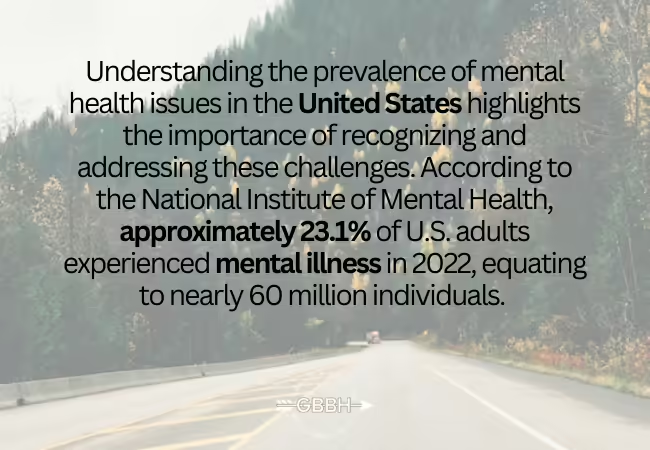Our overall well-being relies on the intricate balance between emotional and mental health. While they are often used interchangeably, emotional and mental health refer to different but interconnected aspects of our well-being. Understanding the distinction can empower individuals to seek the right tools and care to address their unique challenges. At Greater Boston Behavioral Health, our comprehensive Mental Health Treatment Programs integrate therapies like CBT Therapy and DBT Therapy to support both emotional and mental health.
What Is Emotional Health?
Emotional health is the ability to understand, manage, and express emotions effectively. It involves maintaining a positive relationship with your feelings, using them to guide your actions without being overwhelmed.
Characteristics of Emotional Health
- Emotional Awareness: Recognizing and understanding your emotions, such as anger, joy, or sadness.
- Emotional Regulation: Managing emotions constructively without suppressing or overreacting.
- Resilience: Bouncing back from setbacks or emotional distress.
- Positive Relationships: Building meaningful connections by expressing emotions openly and constructively.
Signs of Strong Emotional Health
- Adaptability in the face of stress.
- Balanced emotional responses to challenges.
- Healthy communication of feelings in relationships.
- Self-compassion and acceptance.
Emotional health directly influences how we perceive and respond to life’s challenges, making it a cornerstone of overall well-being.
What Is Mental Health?
Mental health refers to cognitive and psychological well-being. It encompasses how we think, process information, and cope with life’s demands. Mental health is influenced by biological, environmental, and social factors, and its state can fluctuate over time.
Characteristics of Mental Health
- Cognitive Functioning: The ability to think clearly, learn, and solve problems.
- Psychological Resilience: Coping effectively with stress, trauma, or adversity.
- Behavioral Health: Adopting healthy habits and addressing harmful behaviors.
- Adaptability: Adjusting to life changes and maintaining a sense of purpose.
Signs of Strong Mental Health
- Consistent mood stability.
- Clear thinking and decision-making.
- Effective stress management techniques.
- Motivation to engage in daily activities.
While emotional health focuses on feelings, mental health centers on the cognitive and behavioral aspects of how we navigate life.
The Connection Between Emotional and Mental Health
Emotional and mental health are deeply intertwined, with each influencing the other in significant ways. While emotional health focuses on recognizing and managing feelings, mental health encompasses cognitive processes like thinking, decision-making, and coping with life’s demands. When either area is compromised, the other often follows suit.
How Emotional Health Impacts Mental Health
- Chronic emotional distress, such as unresolved anger or sadness, can lead to mental health conditions like anxiety or depression.
- Difficulty regulating emotions may exacerbate negative thinking patterns, fueling mental health challenges.
How Mental Health Impacts Emotional Health
- Mental health disorders, such as PTSD or bipolar disorder, can make it difficult to regulate emotions, causing heightened reactivity or emotional numbness.
- Impaired cognitive functioning, such as negative self-talk, can lead to feelings of hopelessness or frustration.
For instance, unresolved emotional health challenges, such as difficulty managing anger, often benefit from Anger Management Therapy, which addresses both emotional regulation and underlying mental health concerns.
Common Challenges in Emotional and Mental Health
1. Emotional Health Challenges
- Emotional Dysregulation: Intense emotions like anger or sadness become overwhelming and difficult to manage.
- Relationship Struggles: Difficulty expressing emotions can lead to conflict, withdrawal, or strained connections.
- Chronic Stress: Persistent stress can erode emotional resilience, leading to burnout or emotional detachment.
2. Mental Health Challenges
- Anxiety and Depression: Chronic worry, sadness, or feelings of hopelessness disrupt daily life and well-being.
- Cognitive Impairments: Difficulty focusing, making decisions, or processing information impacts personal and professional success.
- Behavioral Health Issues: Harmful coping mechanisms, such as substance use or avoidance, often emerge in response to untreated mental health challenges.
Warning Signs of Mental Health Issues
Mental health issues can manifest in various ways, often impacting thoughts, emotions, and behaviors. Recognizing the warning signs is critical to seeking early intervention and preventing more severe challenges.
1. Emotional Symptoms
- Persistent sadness or feelings of hopelessness.
- Intense anxiety or excessive worry.
- Irritability, anger, or emotional numbness.
2. Cognitive Symptoms
- Difficulty concentrating, making decisions, or remembering details.
- Intrusive thoughts or preoccupation with negative ideas.
- Recurrent thoughts of self-harm or suicide.
3. Behavioral Symptoms
- Withdrawal from friends, family, or activities once enjoyed.
- Sudden changes in sleeping or eating patterns.
- Increased reliance on substances like alcohol or drugs.
4. Physical Symptoms
- Unexplained fatigue, aches, or changes in energy levels.
- Frequent headaches or gastrointestinal problems.
- A noticeable decline in personal hygiene or self-care.
Warning Signs of Emotional Health Issues
Emotional health issues are often reflected in how individuals handle their feelings, relationships, and day-to-day stressors. These signs may indicate struggles with emotional well-being:
1. Emotional Dysregulation
- Frequent mood swings or difficulty calming down after emotional outbursts.
- Heightened sensitivity to criticism or perceived rejection.
2. Difficulty Expressing Emotions
- Inability to identify or articulate feelings.
- Bottling up emotions, leading to sudden outbursts or withdrawal.
3. Impact on Relationships
- Difficulty maintaining close connections due to trust issues or poor communication.
- Overreacting to minor conflicts or withdrawing entirely from social situations.
4. Low Resilience
- Struggling to cope with daily stressors or setbacks.
- Feeling overwhelmed by minor challenges, leading to frustration or burnout.
Mental Health and Substance Use
The connection between mental health and substance use is complex and bidirectional. Mental health issues can lead to substance use as a coping mechanism, while substance use can exacerbate or trigger mental health conditions.
1. The Role of Substance Use in Mental Health
- Coping Mechanism: Individuals may turn to alcohol, drugs, or other substances to numb emotional pain or escape stress.
- Worsening Symptoms: Substance use often intensifies anxiety, depression, and mood instability.
- Delayed Recovery: Reliance on substances can make it harder to engage in or benefit from therapy.
2. Co-Occurring Disorders
- Many individuals face dual diagnoses, where substance use disorders and mental health conditions like PTSD, anxiety, or depression occur simultaneously.
- Integrated treatment is essential to address both issues effectively, ensuring neither one is overlooked.
3. How Treatment Helps
- Therapeutic Approaches: Therapies like CBT and DBT focus on identifying triggers, managing cravings, and improving emotional regulation.
- Holistic Care: Addressing the root causes of both mental health and substance use issues ensures a more sustainable recovery.
- Supportive Environment: Programs at a Mental Health Treatment Center in Boston offer a safe, judgment-free space for healing.
4. Seeking Support
If mental health issues and substance use are affecting your life, seeking professional care is crucial. At Greater Boston Behavioral Health, we provide integrated treatment plans that address both challenges, helping clients rebuild a healthier and more balanced life.
Tips for Supporting Emotional and Mental Health
- Practice Mindfulness:
- Use mindfulness techniques, such as deep breathing or meditation, to stay present and reduce stress.
- Grounding exercises, like focusing on your surroundings, can help manage overwhelming emotions.
- Build Emotional Awareness:
- Reflect on your feelings through journaling or talking with a trusted friend.
- Identify patterns in your emotional responses to understand triggers and develop healthier coping mechanisms.
- Maintain a Healthy Lifestyle:
- Prioritize regular exercise to boost mood and reduce stress.
- Adopt a balanced diet and ensure consistent sleep to support cognitive and emotional health.
- Foster Supportive Relationships:
- Surround yourself with people who encourage open communication and provide emotional validation.
- Strengthen connections through honest conversations and shared activities.
- Seek Professional Guidance:
- Therapy, such as CBT Therapy or DBT Therapy, offers tools to address underlying issues and promote resilience.
- Professional support ensures challenges are addressed effectively, preventing escalation.
When to Seek Help
Seeking help is an essential step when emotional or mental health challenges begin to interfere with daily life. Consider reaching out if:
- Emotions Feel Overwhelming: Persistent feelings of sadness, anger, or anxiety dominate your life.
- Mental Health Symptoms Persist: Issues like difficulty concentrating, chronic fatigue, or low motivation hinder your productivity.
- Relationships Suffer: Emotional or mental health struggles lead to conflict or disconnection with loved ones.
- Coping Mechanisms Are Unhealthy: Reliance on substances, overeating, or avoidance becomes a way to manage feelings.
- Stress Becomes Unmanageable: Chronic stress impacts your ability to function or find joy in daily activities.
How Greater Boston Behavioral Health Supports Emotional and Mental Health
At Greater Boston Behavioral Health, we take a holistic approach to emotional and mental health, addressing both areas to create lasting well-being.
1. Comprehensive Assessments
We begin with a thorough evaluation to understand your unique emotional and mental health needs, ensuring a personalized treatment plan.
2. Evidence-Based Therapies
- Cognitive Behavioral Therapy (CBT): Helps reframe negative thoughts and build healthier patterns for managing stress and emotions.
- Dialectical Behavior Therapy (DBT): Focuses on emotional regulation, mindfulness, and interpersonal skills to address intense emotions and improve relationships.
3. Specialized Programs
- Anger Management Therapy: Addresses the triggers and underlying causes of anger while teaching constructive expression techniques.
- Trauma-Informed Care: Creates a safe space to process past trauma that may affect both emotional and mental health.
4. Integrated Care
We combine therapy with wellness practices, such as mindfulness and relaxation techniques, to support overall recovery.
Conclusion
Understanding the difference between emotional and mental health allows us to address these areas holistically, leading to improved resilience, stronger relationships, and a greater sense of purpose. At Greater Boston Behavioral Health, we provide the tools and support needed to navigate these challenges, helping you achieve lasting balance.
If you or someone you love is struggling with emotional or mental health challenges, contact us today to learn how our Mental Health Treatment Programs can help you take the first step toward a healthier, more fulfilling life. Call us at (888)278-0716 today to learn more about our services and how we can help you on your journey to recovery!
FAQ on Mental and Emotional Health
What are the warning signs of mental health issues?
Warning signs include persistent sadness, anxiety, mood swings, withdrawal from loved ones, changes in sleep or appetite, and difficulty concentrating or making decisions.
How do emotional health issues differ from mental health issues?
Emotional health focuses on recognizing, expressing, and managing emotions, while mental health encompasses cognitive and psychological functioning, including thinking, decision-making, and coping with stress.
What are the warning signs of emotional health issues?
Signs include frequent mood swings, difficulty expressing feelings, low resilience to stress, and challenges in maintaining healthy relationships.
How are mental health and substance use connected?
Mental health challenges can lead to substance use as a coping mechanism, while substance use can exacerbate or trigger mental health conditions, creating a cycle that requires integrated treatment.
What is dual diagnosis or co-occurring disorders?
Dual diagnosis refers to the presence of both a mental health condition and a substance use disorder. Treating both simultaneously is essential for effective recovery.
How can CBT and DBT help with mental and emotional health?
- CBT Therapy: Helps reframe negative thought patterns and develop healthier coping mechanisms.
- DBT Therapy: Focuses on emotional regulation, mindfulness, and interpersonal skills to manage intense emotions effectively.
When should I seek professional help for mental or emotional health issues?
Seek help if symptoms interfere with daily life, relationships, or productivity, or if you rely on unhealthy coping mechanisms like substance use to manage emotions.


